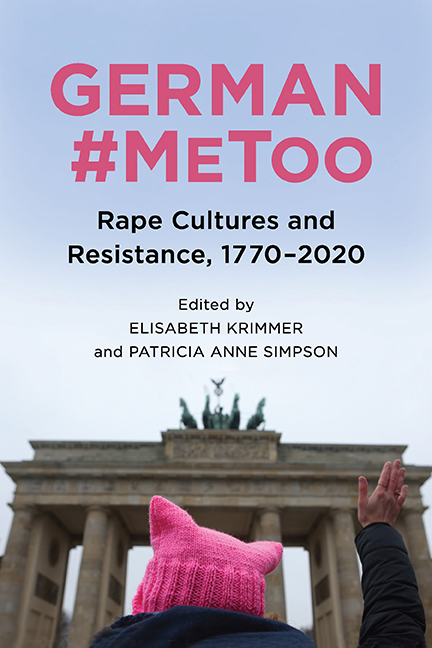Introduction
Published online by Cambridge University Press: 08 October 2022
Summary
Ich, der ich immer gehörthatte, auf die Ohrfeige eines Mädchens gehöre einderber Kuß, faßte sie bei den Ohren und küßte siezu wiederholten Malen. Sie aber tat einen solchendurchdringenden Schrei, der mich selbsterschreckte.
—Goethe, “Der Neue Paris,” Dichtung und Wahrheit,1811[I, who had always heard that a girl's slapshould be followed by a rough kiss, took her bythe ears and kissed her repeatedly. But she gavesuch a piercing scream that it startled evenme.]
ON OCTOBER 5, 2017, Jodie Kantor and Megan Twohey ofthe New York Timespublished an article that detailed how, for decades,the movie producer Harvey Weinstein had paid off andthus silenced women who accused him of sexualharassment. On October 15, the actress Alyssa Milanoretweeted the suggestion of a friend: “If all thewomen who have been sexually harassed or assaultedwrote ‘Me too.’ as a status, we might give people asense of the magnitude of the problem.” In the nexttwenty-four hours, twelve million Facebook postsresponded to this invitation. Through her tweet,Milano introduced to a mainstream audience amovement founded in 2006 by Tarana Burke in order tosupport young women of color who had experiencedsexual abuse. In the weeks and months after Milano'stweet, #MeToo resonated around the globe, includingin France as #BalanceTonPorc, in China as#RiceBunny, in Spain as #YoTambien, and as #ichauchin Germany, where the most prominent cases involvedaccusations of sexual assault against the directorDieter Wedel and against Siegfried Mauser, thepresident of the Musikhochschule Munich.
The worldwide resonance of #MeToo drasticallyillustrates the ubiquity of sexual abuse and sexualviolence and of the failure to acknowledge theirimpact publicly. It shows that there is a great neednot only to hold perpetrators accountable but alsoto raise public consciousness. All too often,attention is directed exclusively to thevictimization of white middle- class women, whileneglecting the experiences of women from lowersocioeconomic backgrounds, women of color, membersof LGBTQ and immigrant communities, and also of men,including, but not limited to, the rape of maleprison inmates.
- Type
- Chapter
- Information
- German #MeTooRape Cultures and Resistance, 1770-2020, pp. 1 - 32Publisher: Boydell & BrewerPrint publication year: 2022



